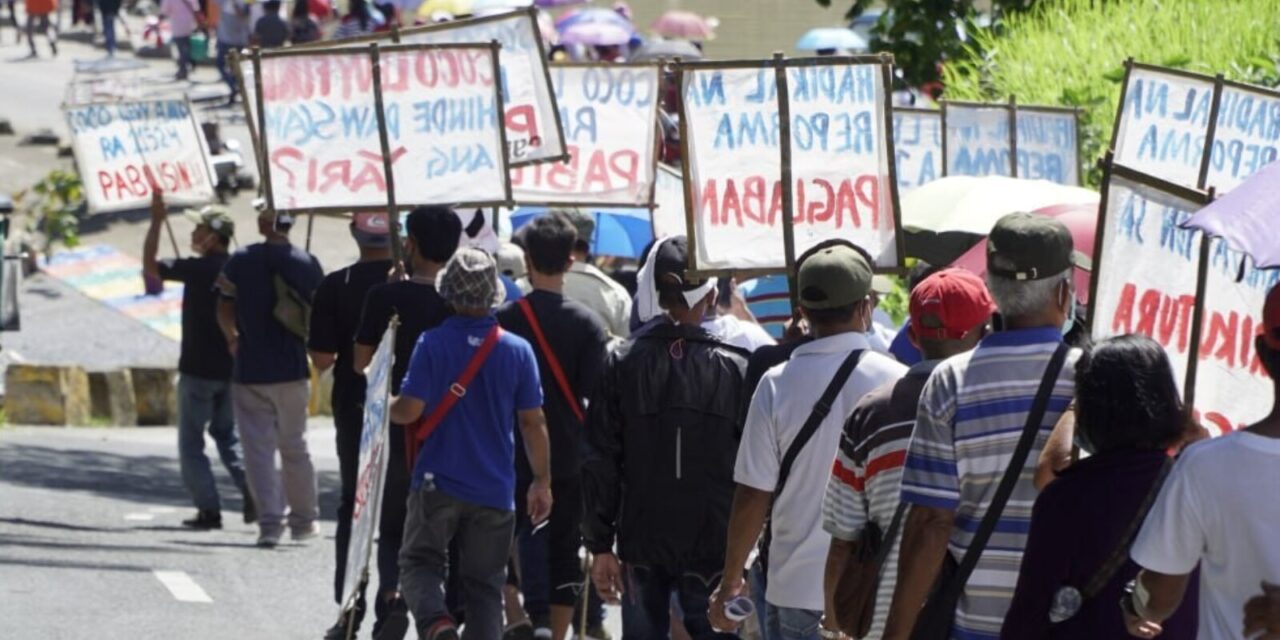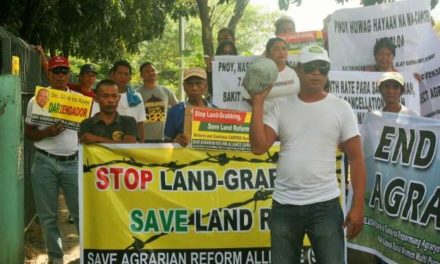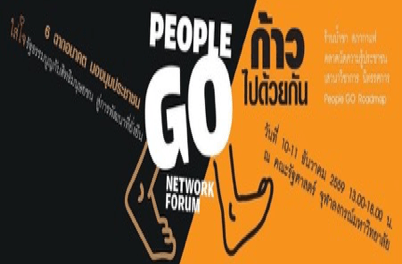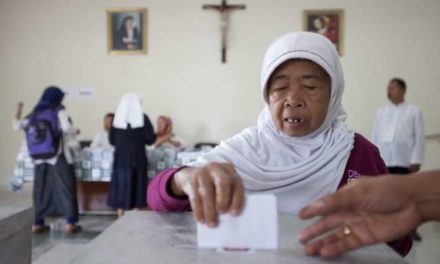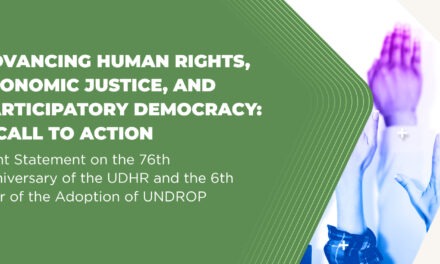Today, we join hands with peasants, fisher peoples, landless rural workers, small-scale food producers, Indigenous Peoples, and other peoples working in rural areas around the world to mark the International Day of Peasant Struggles.
Land grabbing continues to intensify, driven by agribusiness, mining, energy projects, and so-called “development” plans. Forests and ancestral lands are cleared, our territories are converted into commercial sites, and water sources are privatized – all to make way for profit-driven investments.
When peasants resist, they are met with repression. They are harassed, surveilled, and falsely labeled as “anti-development” and enemies of the state. Many are imprisoned on fabricated charges. Others never return home. Their right to organize is under attack and their communities live in fear. Meanwhile, those who destroy the land and violate human rights enjoy protection, and are even rewarded.
This is a systematic effort to dismantle resistance, silence dissent, and clear the way for capital accumulation. And yet, peasants continue to rise. They organize, resist, and assert their right to land, food, and life with dignity.
On this day, we honor the farmers of Samahan ng Nagkakaisang Mamamayan ng Barangay Sumalo (SANAMABASU) Hermosa, Bataan for their courage. Since 2009, the organization has been tirelessly defending their land against Litton & Co., Inc and Riverforest Development Corporation (RDC)’s attempt to convert it into industrial use, leading to their criminalization by the corporation. Although the farmers, charged with non-bailable offenses, were released on bail on January 8, 2025, the community now faces renewed repression, as RDC has filed ejectment cases to displace them from their homes and farmlands.
On September 16, 2024, a group of independent human rights experts mandated by the United Nations Human Rights Council (3 Special Rapporteurs and 2 Working Groups) sent letters to the Government of the Republic of the Philippines and to Litton & Co., Inc. and Riverforest Development Corporation (RDC). Both letters highlighted significant human rights concerns regarding the situation in the community. Key issues included forced evictions, housing demolitions, restricted access to cultivated land, criminalization, and the prohibition of agricultural activities.
In a response dated January 16, 2025, RDC refuted the allegations. They asserted that the land in question was unsuitable for agriculture, claiming that no legitimate farmers were tilling it. They accused certain community members of exploiting the Comprehensive Agrarian Reform Program (CARP) for personal gain and described their actions as illegal. RDC defended its eviction efforts as lawful, claiming that they are targeting only those obstructing development plans.
Meanwhile, the response from the government of the Philippines dated January 23, 2025 claimed that the syndicated estafa case filed against the farmers “have already been dismissed due to insufficiency of evidence.” They also laid down some other efforts of the government on agrarian reform. However, this is untrue as farmers continue to attend court hearings in the two pending cases of syndicated estafa cases.
On January 28, 2025, the House Committee on Agrarian Reform conducted a Congressional inquiry on the criminalization and harassment faced by farmers and agrarian reform beneficiaries (ARBs) in the country. Despite this being a positive development, the Congress is now in session break until June to give leeway for the upcoming elections in May. This means that another lobbying effort would be needed in the next Congress starting July, as a new set of representatives will occupy the Congressional seats.
With these developments, we reaffirm our commitment to their cause and to all farmers facing the same dilemma. We raise our voices in unity to demand:
- The implementation of agrarian reform and the redistribution of land to those who till it;
- The protection of ancestral domains and Indigenous territories;
- An end to land grabbing and corporate-led development aggression;
- The repeal of laws and policies that favor corporations over communities;
- Justice for victims of land-related killings, arrests, and harassment;
- An end to the criminalization, militarization, and red-tagging of peasant leaders and advocates;
- The recognition and protection of the rights of peasants, as enshrined in the United Nations Declaration on the Rights of Peasants and Other People Working in Rural Areas (UNDROP); and
- Food sovereignty, not corporate-controlled food systems.
We honor those who have fallen, those imprisoned for defending the land, and those who continue to fight in the face of threats and fear. Your courage lives on in every seed planted, every barricade built, every piece of land reclaimed, and every collective struggle for justice won.
Land to the tillers. Justice for the oppressed.
Long live peasant resistance!
Signed:
Kilusan para sa Repormang Agraryo at Katarungang Panlipunan (KATARUNGAN), Philippines
Anti-jindal & Anti-POSCO Movement (JPPSS) Odisha, India
Bangladesh Food Security Network- KHANI, Bangladesh
Centre Europe – Tiers Monde (CETIM)
Claudio Schuftan, PHM and WPHNA
Coastal Action Network (CAN), India
Feminist Dalit Organization (FEDO), Nepal
FIAN Austria
FIAN Indonesia
FIAN International
FIAN Nepal
FIAN Sri Lanka
FIAN Switzerland
Focus on the Global South
Gaza Urban & Peri-urban Agriculture Platform (GUPAP), Gaza, Palestine
Habitat International Coalition-Housing and Land Rights Network
Lanka Organic Agricultural Movement (LOAM), Sri Lanka
National Fisheries Solidarity Movement in Sri Lanka
Pakistan Kissan Rabita Committee, Pakistan
Participatory Research & Action Network- PRAAN, Bangladesh
Prof. Dr. Anne C Bellows, Syracuse University, USA
Seed and Knowledge Initiative (SKI)
UBINIG, Bangladesh
Youth’s Forum for Protection of Human Rights, Manipur, India
Zambia Alliance for Agroecology and Biodiversity (ZAAB)
For more information, please contact KATARUNGAN at danny.carranza[at]gmail.com and katarungan.inc[at]gmail.com or Focus on the Global South at raphael.baladad[at]focusweb.org

